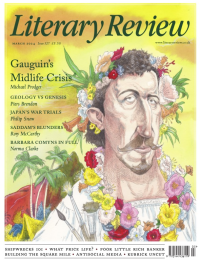Jennifer Potter
Lost in Translation
The Extinction of Irena Rey
By Jennifer Croft
Scribe 309pp £16.99
‘Translators are like ninjas. If you notice them, they’re no good.’ An acclaimed translator herself, American author Jennifer Croft tosses this quotation (from the Israeli writer Etgar Keret) into a wry footnote in The Extinction of Irena Rey, a work purportedly written in Polish by a Spanish-speaking translator raised in South America, as translated into English by an American woman living in Ulaanbaatar. Lost already? Croft’s multilayered metafiction builds on her earlier fictionalised memoir, Homesick, and a string of translations from Polish, Ukrainian and Argentine Spanish into English, notably Olga Tocarczuk’s Flights – which won author and translator the 2018 International Booker Prize – and The Books of Jacob, cited as Tocarczuk’s magnum opus when she was awarded the Nobel Prize in Literature that same year.
In the unseasonably warm autumn of 2017, eight translators arrive at the home of ‘Our Author’ in the primeval Białowieża Forest, which straddles the border between Poland and Belarus. Irena Rey’s masterpiece is ready to be translated into their various languages: English, French, German, Serbian, Slovenian, Spanish, Swedish and Ukrainian, but not Japanese, much to Rey’s chagrin. ‘We treated her every word as sacred, even though our whole task was to replace her every word,’ notes the adoring narrator in this tale of gradual disenchantment, which refracts many elements of fiction – surprise, suspense, detection, romance, fable, autofiction, eco-horror – through the lens of translation.
Rey behaves bizarrely from the outset. Her husband is inexplicably absent. She presents her translators with pouches of dried fungi and rants about the loggers who have arrived to chop down the forest’s spruce trees, ostensibly to eradicate a non-native beetle (which has been able to establish itself thanks to

Sign Up to our newsletter
Receive free articles, highlights from the archive, news, details of prizes, and much more.@Lit_Review
Follow Literary Review on Twitter
Twitter Feed
Alfred, Lord Tennyson is practically a byword for old-fashioned Victorian grandeur, rarely pictured without a cravat and a serious beard.
Seamus Perry tries to picture him as a younger man.
Seamus Perry - Before the Beard
Seamus Perry: Before the Beard - The Boundless Deep: Young Tennyson, Science, and the Crisis of Belief by Richard Holmes
literaryreview.co.uk
Novelist Muriel Spark had a tongue that could produce both sugar and poison. It’s no surprise, then, that her letters make for a brilliant read.
@claire_harman considers some of the most entertaining.
Claire Harman - Fighting Words
Claire Harman: Fighting Words - The Letters of Muriel Spark, Volume 1: 1944-1963 by Dan Gunn
literaryreview.co.uk
Of all the articles I’ve published in recent years, this is *by far* my favourite.
✍️ On childhood, memory, and the sea - for @Lit_Review :
https://literaryreview.co.uk/flotsam-and-jetsam